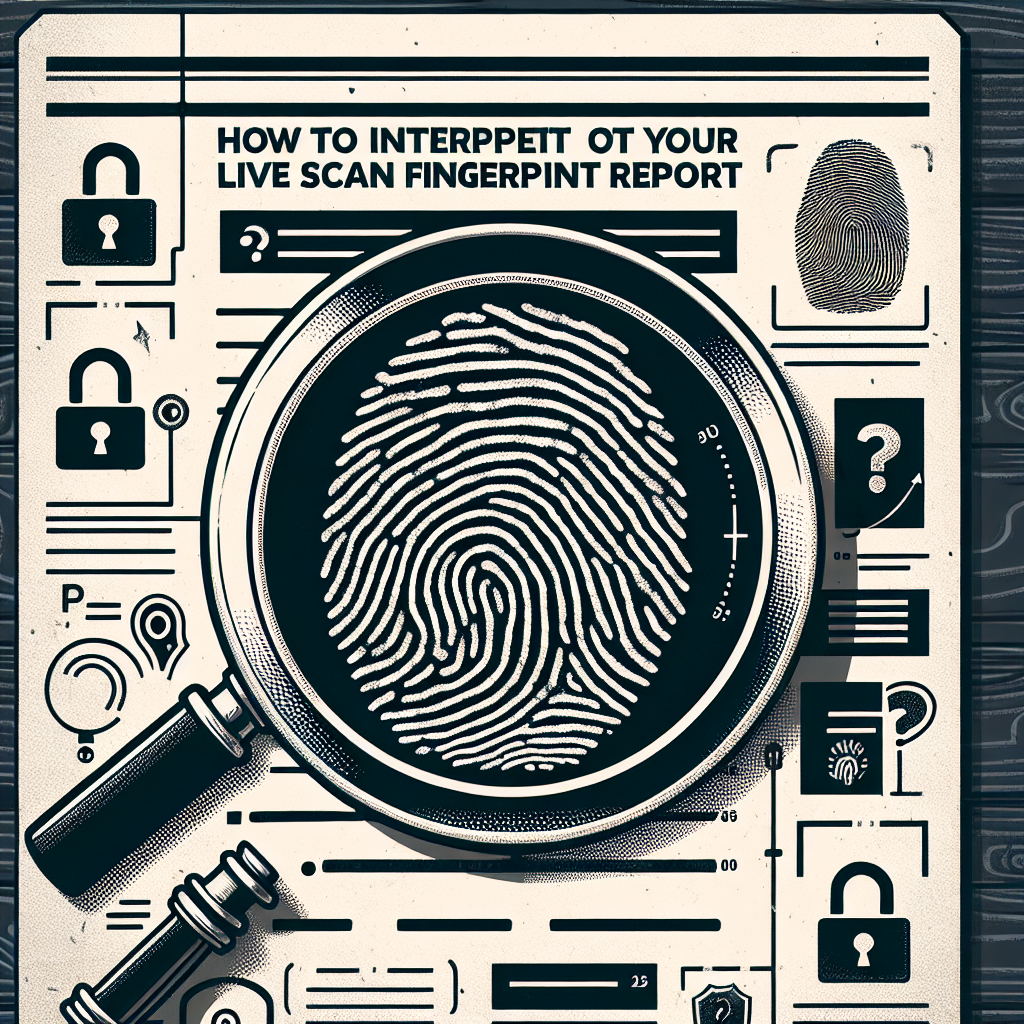How to Understand Your Live Scan Fingerprint Report
Introduction
When you hear about a Live Scan Fingerprint Report, it might sound like something from a spy movie. But it’s really a common document. Whether you’re applying for a new job, a professional license, or volunteering, understanding your Live Scan Fingerprint Report is important. This blog post will help you learn the basics of Live Scan fingerprinting, understand the different parts of the report, and give you tips on how to read each section.
Understanding Live Scan Fingerprinting
Live Scan fingerprinting is a new, inkless way to take fingerprints. Unlike the old ink and paper method, Live Scan uses digital technology to capture and send fingerprints electronically. It’s widely used for background checks by employers, licensing boards, and government agencies. This quick process not only makes information sharing faster but also helps reduce mistakes that happen with the old methods.
Parts of a Live Scan Fingerprint Report
Before getting started, it’s good to know what you’ll be looking at. A Live Scan report usually has several main sections:
- Personal Identification Information: This includes your name, date of birth, social security number, and other details about you.
- Transaction Information: Details about when and where the fingerprinting happened, and which agency asked for it.
- Results Summary: A quick overview showing if your fingerprints passed the check.
- Criminal History Record Information: If needed, this shows any arrests, charges, or convictions you might have.
Step-by-Step Guide to Reading Your Report
How to Find and Check Personal Information
Begin by looking at the personal information section. Make sure all details are correct, because this information is the basis of your report. Any mistakes here could lead to wrong results or misidentification.
Understanding the Transaction Information Section
This part includes:
- Agency that Requested the Live Scan: Check which organization asked for your background check.
- Date and Location of the Scan: Make sure this matches your records.
- Transaction Identifier (OCA): A unique code for your fingerprint transaction, important for future reference.
Explanation of the Results Summary
The Results Summary tells you if you passed the background check. Words like “cleared,” “not cleared,” or “reviewed” are used:
- Cleared: No issues were found with your fingerprints.
- Not Cleared: There might be a problem that needs more action or clarification.
- Reviewed: Some entries need more evaluation.
Understanding Criminal History Record Information
If needed, this section may list any arrest records, charges, or outcomes. Here’s how to read this data:
- Arrest Records: Shows when and where you were arrested.
- Charges: Lists any charges brought against you.
- Dispositions: Shows the result of each charge.
Watch out for mistakes or differences in state reporting. If something seems wrong, more checking might be needed.
Common Misunderstandings
Understanding your Live Scan report can be tricky, and misunderstandings are common:
- Pending Charges and Past Convictions: Make clear if an incident is still pending or has been solved.
- No Record Found: This usually means no criminal history is present, which is good.
- Non-Reportable Offenses: Not all offenses are reported on these checks. Small misdemeanors, for instance, might not appear.
Legal Rights and Privacy Concerns
Knowing your rights about fingerprinting is important:
- Privacy Laws: Different laws protect your personal data and limit who can see your fingerprint records.
- Data Use: Your information is used only for the check’s purpose and should be handled by authorized people only.
- Correcting Errors: If you find a mistake, report it right away. Agencies often have ways to dispute inaccuracies.
What to Do Next
If your report shows a criminal history:
- Get official court documents that show any incidents mentioned.
- Dispute mistakes with the agency that did the Live Scan, if necessary.
- Get legal advice if needed to work through complicated situations.
Conclusion
Understanding your Live Scan Fingerprint Report is necessary for keeping an accurate record. This document can affect job opportunities, licensing, and more. If you find mistakes or need help understanding your report, don’t hesitate to seek professional help. Your personal record’s accuracy is crucial—make sure it’s dealt with carefully and precisely.
Additional Resources
For more information, check out these resources:
- California Department of Justice Live Scan Information
- Federal Bureau of Investigation Fingerprint Guidelines
- Contact information for legal aid and support agencies.
Call to Action
Stay informed about your personal records by regularly checking your reports. Sign up for updates on fingerprinting and related topics, and share this post to help others understand their Live Scan reports better. If you have any questions or need help, don’t hesitate to reach out to the right agencies or legal advisors for support.
Need someone to walk you through your Live Scan report? We have experts on hand at Tags Clinic ready to assist. Visit us at 3845 University Ave, San Diego, CA or give us a call at 619-777-9046. You can also visit our website at tagsclinic.com. Looking forward to seeing you soon!
